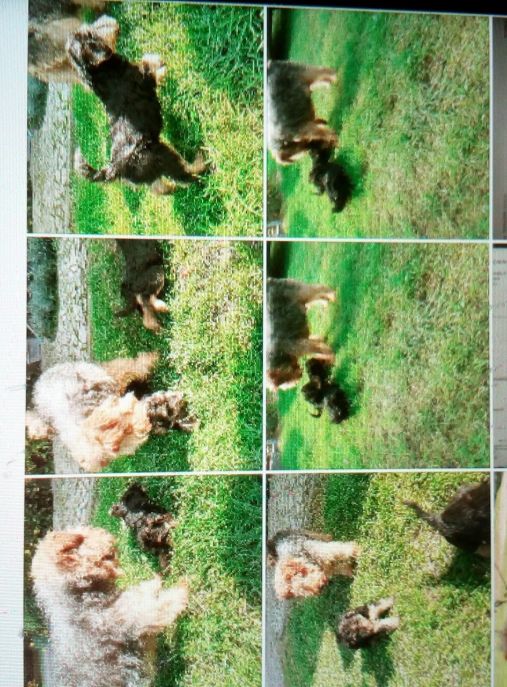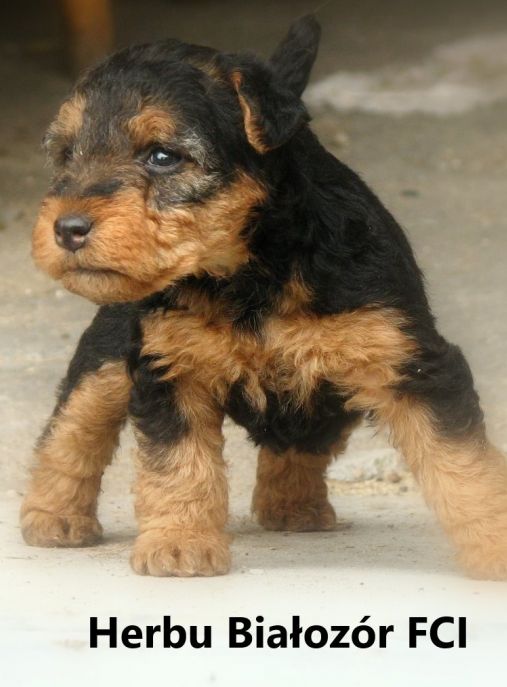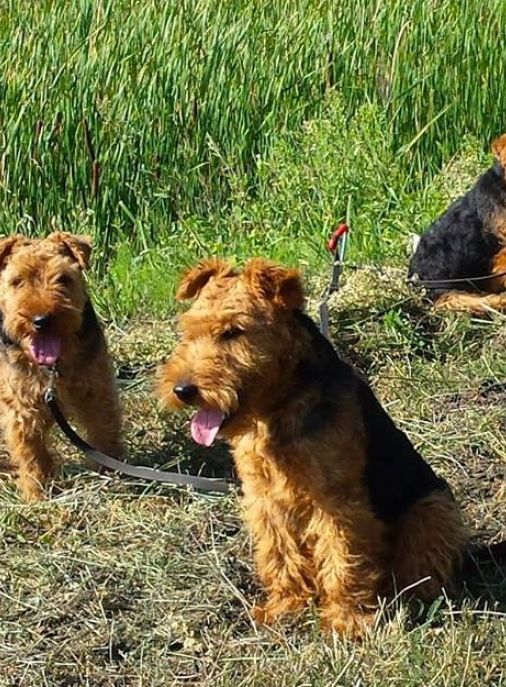The Welsh Terrier is a small to medium-sized dog breed known for its distinctive appearance and lively personality. With its wiry coat, compact body, and alert expression, this breed is easily recognizable and highly regarded among dog enthusiasts. Originating from Wales, this terrier breed has a rich history and a strong connection to its homeland.
The history of the Welsh Terrier dates back several centuries, with its exact origins somewhat unclear. It is believed to have descended from the Old English Black and Tan Terrier, which was a popular hunting dog in the British Isles. Over time, the breed was refined and developed in Wales to suit the specific needs of Welsh hunters. Its primary role was to hunt and control vermin, such as rats, foxes, and badgers.
According to the Fédération Cynologique Internationale (FCI) typology, the Welsh Terrier belongs to Group 3: Terriers. This group includes various terrier breeds that share common characteristics such as courage, determination, and a strong prey drive. Within this group, the Welsh Terrier is classified under Section 1: Large and Medium-sized Terriers.
Welsh Terriers are versatile dogs that can adapt to various lifestyles. They make excellent family pets, as they are known for their loyalty, affection, and love for children. However, they do have a strong hunting instinct, so it is important to provide them with proper training and socialization from an early age. They thrive in active households where they can receive regular exercise and mental stimulation.
In terms of physical attributes, the Welsh Terrier is a sturdy and well-balanced breed. Males typically weigh between 20 to 22 pounds (9 to 10 kilograms), while females are slightly lighter, ranging from 18 to 20 pounds (8 to 9 kilograms). Their height at the shoulder usually falls between 14 to 15 inches (35 to 38 centimeters). Despite their small size, Welsh Terriers are known for their endurance and agility.
The breed's most distinctive feature is its wiry, dense, and weather-resistant double coat. The outer coat is hard and wiry, while the undercoat is soft and dense. The coat is typically black and tan, with the black color dominating the body and the tan appearing on the legs, head, and underbelly. Regular grooming is necessary to maintain the coat's texture and prevent matting.
Welsh Terriers have a life expectancy of around 12 to 15 years, which is relatively long for a small to medium-sized breed. They are generally healthy dogs, but like any breed, they may be prone to certain health issues. Some common concerns include allergies, skin problems, hip dysplasia, and certain eye conditions. Regular veterinary check-ups and a balanced diet are essential for maintaining their overall well-being.
In addition to their hunting prowess and charming appearance, Welsh Terriers possess several interesting traits. They are known for their intelligence, which makes them highly trainable and capable of learning various commands and tricks. They are also quite vocal and will not hesitate to alert their owners to any potential threats or intruders. Their spirited nature and zest for life make them a joy to be around.
In conclusion, the Welsh Terrier is a delightful breed with a rich history and a distinct appearance. Their origins as skilled hunters have shaped their characteristics, making them versatile companions for active families. With their loyalty, affection, and intelligence, Welsh Terriers have rightfully earned their place in the hearts of dog lovers worldwide.

The Welsh Terrier, a small but mighty breed, is known for its distinct character and charming personality. With their unique appearance and spirited nature, Welsh Terriers make for wonderful companions and loyal family pets. In this text, we will delve into the character of Welsh Terriers, their behavior, and provide insights on raising and training them.
Welsh Terriers are often described as intelligent, alert, and full of energy. They possess a strong sense of independence and are known to be quite confident in their abilities. This breed is highly adaptable and can thrive in various living environments, including apartments or houses with yards. However, it's important to note that they require regular exercise to keep them mentally and physically stimulated.
One of the defining characteristics of Welsh Terriers is their friendly and affectionate nature. They are known to be great with children and can form strong bonds with their human family members. However, they can be reserved and cautious around strangers, making them excellent watchdogs. Early socialization is crucial to ensure they develop into well-rounded dogs who are comfortable in different situations.
While Welsh Terriers are generally good-natured, they do have a strong prey drive due to their terrier heritage. This means they may have a tendency to chase small animals or exhibit territorial behavior. It is important to provide them with proper training and supervision to manage these instincts effectively.
Training a Welsh Terrier requires consistency, patience, and positive reinforcement. They are intelligent dogs who quickly grasp commands and enjoy mental stimulation. Early obedience training and socialization are essential to prevent any potential behavioral issues. Engaging in activities such as agility training or obedience competitions can help channel their energy and provide them with a sense of purpose.
Welsh Terriers are known for their stubborn streak, which can make training a challenge at times. It is important to establish yourself as the pack leader and use positive reinforcement techniques such as treats, praise, and play to motivate them. Harsh training methods or punishment can be counterproductive and may lead to resistance or fear.
Grooming a Welsh Terrier is relatively low maintenance compared to other terrier breeds. Their wiry double coat requires regular brushing to prevent matting and occasional hand-stripping to maintain its texture. Regular ear cleaning, nail trimming, and dental care are also important aspects of their grooming routine.
In conclusion, Welsh Terriers possess a unique character that combines intelligence, independence, and affection. They make excellent family pets but require proper training, socialization, and exercise to thrive. With the right approach, patience, and love, Welsh Terriers can become well-behaved, loyal companions who bring joy and laughter to their families.
The Welsh Terrier is a charming and energetic breed known for its intelligence, loyalty, and playful nature. To ensure the well-being and happiness of your Welsh Terrier, it is essential to provide them with proper care and attention. Here is an extensive description of recommended care for Welsh Terrier dogs, including tips on what to do and what not to do.
1. Exercise: Welsh Terriers are active dogs that require regular exercise to keep them physically and mentally stimulated. Aim for at least 30-60 minutes of exercise daily, which can include walks, playtime, or interactive games. However, be cautious not to overexert them, especially in extreme weather conditions.
2. Grooming: Welsh Terriers have a wiry, double coat that requires regular grooming to keep it in good condition. Brush their coat at least once a week to prevent matting and remove loose hair. Hand-stripping, a technique where dead hair is plucked out, is recommended every few months to maintain the coat's texture. Regularly check their ears for any signs of infection and trim their nails as needed.
3. Training and socialization: Start training your Welsh Terrier from an early age to establish good behavior and obedience. They are intelligent dogs that respond well to positive reinforcement techniques. Socialize them with other dogs, animals, and people to prevent any potential aggression or fearfulness.
4. Mental stimulation: Welsh Terriers are intelligent and curious dogs, so mental stimulation is crucial to prevent boredom and destructive behavior. Provide them with puzzle toys, interactive games, and training sessions to keep their minds engaged. Consider enrolling them in agility or obedience classes to challenge their abilities.
5. Nutrition: Feed your Welsh Terrier a balanced and high-quality diet that meets their nutritional needs. Consult with your veterinarian to determine the appropriate portion sizes and feeding schedule based on their age, size, and activity level. Avoid overfeeding to prevent obesity, which can lead to various health issues.
6. Health care: Regular veterinary check-ups are essential to ensure your Welsh Terrier's overall health. Vaccinations, parasite prevention, and dental care should be part of their routine healthcare. Additionally, be aware of breed-specific health concerns such as allergies, skin issues, and glaucoma. Early detection and treatment are crucial for a long and healthy life.
7. Safety: Create a safe environment for your Welsh Terrier by securing your yard with a fence and ensuring they cannot escape. Keep harmful substances, toxic plants, and small objects out of their reach. Provide them with a comfortable and well-ventilated living space that protects them from extreme temperatures.
What not to do:
1. Neglect exercise: Lack of exercise can lead to behavioral problems and obesity. Avoid confining your Welsh Terrier to a sedentary lifestyle.
2. Use harsh training methods: Welsh Terriers respond best to positive reinforcement techniques. Avoid using punishment or harsh training methods that can damage their trust and confidence.
3. Overfeed or feed inappropriate food: Overfeeding can lead to obesity, which can have severe health consequences. Avoid feeding your Welsh Terrier table scraps, as some human foods can be toxic to dogs.
4. Skip grooming: Neglecting grooming can result in a matted and uncomfortable coat. Regular brushing and hand-stripping are essential for their coat's health and appearance.
5. Isolate or ignore socialization: Welsh Terriers thrive on social interaction. Avoid isolating them or neglecting their socialization needs, as it can lead to behavioral issues.
Remember, each Welsh Terrier is unique, and their care may vary slightly. Always consult with your veterinarian for personalized advice and guidance to ensure your Welsh Terrier leads a happy and healthy life.
The Welsh Terrier, a charming and spirited breed, is known for its distinctive coat color that adds to its overall appeal. The common color of Welsh Terrier dogs is a rich and vibrant shade of red, often described as a deep mahogany or rusty hue. This coloration is one of the defining characteristics of the breed and contributes to their unique and eye-catching appearance.
The red color of the Welsh Terrier's coat is evenly distributed throughout its body, giving it a uniform and seamless look. The intensity of the red can vary slightly from dog to dog, with some individuals displaying a more intense and saturated shade, while others may have a slightly lighter or softer tone. However, regardless of the specific shade, the red color remains the dominant and most prevalent characteristic of the Welsh Terrier's coat.
The red coat of the Welsh Terrier is further enhanced by its texture and composition. It is typically dense, wiry, and weather-resistant, providing protection against the elements and giving the dog a rugged and robust appearance. The wiry texture of the coat also adds to the breed's overall charm and character, giving them a distinct and unique look.
In addition to the red coat, Welsh Terriers often have black markings on their muzzles, ears, and sometimes on their bodies. These black markings create a striking contrast against the red background, further accentuating the dog's facial features and adding depth to their overall appearance. The black markings can vary in size and shape, with some dogs having larger and more prominent markings, while others may have smaller and more subtle ones.
The combination of the rich red coat and the contrasting black markings gives the Welsh Terrier a regal and elegant look. It is this unique coloration that sets them apart from other terrier breeds and makes them instantly recognizable. Whether they are seen trotting proudly in the show ring or exploring the great outdoors, the Welsh Terrier's red coat is sure to catch the eye and leave a lasting impression.
In conclusion, the common color of Welsh Terrier dogs is a deep and vibrant shade of red, often described as a rich mahogany or rusty hue. This color is evenly distributed throughout their coat, which is dense, wiry, and weather-resistant. The addition of black markings on their muzzles, ears, and bodies creates a striking contrast and adds to their overall allure. The Welsh Terrier's red coat is a defining characteristic of the breed, contributing to their unique and captivating appearance.
The Welsh Terrier is a small to medium-sized breed known for its friendly and energetic nature. When it comes to their health, Welsh Terriers are generally considered to be a robust and healthy breed. However, like all dogs, they are prone to certain health conditions. Understanding these common diseases and taking appropriate care can help ensure the well-being of your Welsh Terrier.
One of the most prevalent health issues in Welsh Terriers is allergies. These can manifest as skin irritations, itching, and ear infections. Allergies can be triggered by various factors such as food, pollen, dust mites, or certain chemicals. Regular grooming, including bathing with hypoallergenic shampoos, can help alleviate symptoms. Identifying and eliminating potential allergens from their environment, such as switching to a grain-free diet, can also be beneficial.
Another common health concern in Welsh Terriers is hip dysplasia. This is a genetic condition where the hip joint doesn't develop properly, leading to pain, lameness, and arthritis. Responsible breeders often screen their dogs for hip dysplasia before breeding, so it's important to choose a reputable breeder when getting a Welsh Terrier puppy. Regular exercise, a balanced diet, and maintaining a healthy weight can help reduce the risk and manage the symptoms of hip dysplasia.
Patellar luxation is another condition seen in Welsh Terriers. It occurs when the kneecap slips out of place, causing discomfort and difficulty in walking. Mild cases can be managed with exercise and weight control, while severe cases may require surgical intervention. Regular veterinary check-ups can help identify this condition early on, allowing for appropriate treatment.
Like many other terrier breeds, Welsh Terriers are also prone to certain eye problems. Lens luxation, cataracts, and glaucoma are some of the ocular conditions that can affect them. Regular eye examinations by a veterinarian can help detect these issues early, increasing the chances of successful treatment.
Maintaining good dental hygiene is crucial for Welsh Terriers. They are prone to dental diseases such as tartar buildup, gum infections, and tooth loss. Regular brushing, dental chews, and professional cleanings can help prevent these issues and ensure good oral health.
To care for the overall health of your Welsh Terrier, regular exercise is essential. They have high energy levels and require daily walks, playtime, and mental stimulation. A nutritious diet tailored to their specific needs, including high-quality dog food, is vital. Regular veterinary check-ups, vaccinations, and preventive treatments for parasites like fleas and ticks are also important.
Welsh Terriers thrive in a loving and stimulating environment. They are social dogs and require regular interaction with their owners and other animals. Mental stimulation through training, puzzle toys, and games can help prevent behavioral issues that may arise from boredom.
In conclusion, while Welsh Terriers are generally healthy dogs, they are prone to certain conditions like allergies, hip dysplasia, patellar luxation, eye problems, and dental diseases. By being aware of these potential health issues and taking proactive measures such as regular veterinary care, appropriate exercise, a balanced diet, and good dental hygiene, you can ensure your Welsh Terrier leads a happy and healthy life.
The Welsh Terrier is a small, sturdy, and energetic breed known for its friendly and intelligent nature. To ensure their overall health and well-being, it is crucial to provide them with a balanced and nutritious diet. Proper nutrition plays a vital role in maintaining their energy levels, promoting healthy growth, and preventing various health issues. Here is an extensive description of the nutrition of Welsh Terrier dogs, including advice on feeding and what to avoid.
Feeding a Welsh Terrier should involve a combination of high-quality commercial dog food and fresh, natural ingredients. Look for dog food that is specifically formulated for small breeds or all life stages, as it will provide the necessary nutrients in appropriate proportions. Always check the ingredients list and opt for products that list real meat as the primary ingredient, avoiding those with fillers, by-products, or artificial additives.
Protein is an essential component of a Welsh Terrier's diet, as it aids in muscle development and repair. Look for dog food that contains high-quality sources of protein, such as chicken, turkey, fish, or lamb. Aim for a protein content of around 20-30% in their diet.
Fats are another crucial nutrient for Welsh Terriers, providing them with energy and supporting healthy skin and coat. Look for dog food that contains healthy fats, such as omega-3 and omega-6 fatty acids, which can be found in fish oil or flaxseed. Avoid excessive fat content, as it can lead to weight gain and related health issues.
Carbohydrates are a source of energy for dogs, but it's important to choose complex carbohydrates that release energy slowly. Look for dog food that contains whole grains like brown rice or oats, which provide fiber and essential nutrients. Avoid foods with excessive amounts of simple carbohydrates, such as corn or wheat, as they can cause digestive issues and allergies in some dogs.
Fruits and vegetables are excellent additions to a Welsh Terrier's diet, providing essential vitamins, minerals, and antioxidants. Incorporate a variety of fruits and vegetables like carrots, sweet potatoes, blueberries, and spinach. However, avoid feeding them toxic foods like grapes, raisins, onions, garlic, or avocados, as they can be harmful to dogs.
Feeding frequency is also important for Welsh Terriers. Puppies require more frequent meals, typically three to four times a day, while adult dogs can be fed twice a day. Avoid free-feeding or leaving food out all day, as it can lead to overeating and obesity.
Portion control is crucial to prevent weight gain or obesity. Follow the feeding guidelines provided on the dog food packaging, but keep in mind that individual dogs may have different needs based on their activity level, age, and metabolism. Monitor their body condition and adjust the portion sizes accordingly.
Always provide fresh, clean water for your Welsh Terrier to keep them hydrated throughout the day. Avoid feeding them table scraps, as they can be high in fat, salt, or harmful ingredients like chocolate or caffeine.
In conclusion, feeding a Welsh Terrier a balanced and nutritious diet is essential for their overall health and well-being. Choose high-quality dog food with real meat as the primary ingredient, provide a variety of fruits and vegetables, and avoid harmful foods. Monitor their portion sizes, feed them at appropriate intervals, and always provide fresh water. By following these guidelines, you can ensure that your Welsh Terrier remains healthy, happy, and full of energy.














